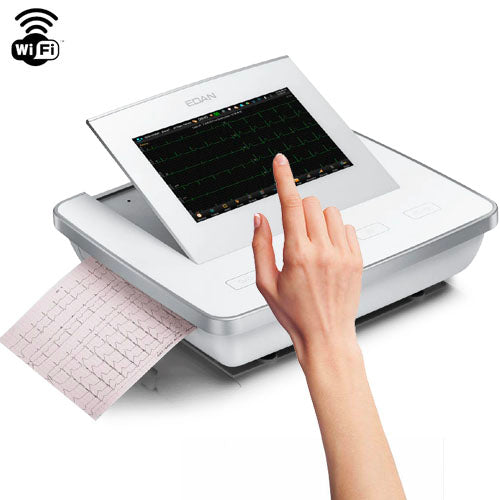The electrocardiogram (ECG) is a cornerstone of cardiac diagnostics, providing a visual representation of the electrical activity of the heart. For healthcare professionals, having the right ECG machine is essential for accurate diagnoses and efficient patient care.
However, navigating the world of ECG machines with their varying features and functionalities can be overwhelming. This guide simplifies the selection process, empowering you to choose the right ECG machine for your specific needs.
Understanding ECG Machines: Features and Functionalities
At its core, an ECG machine measures and records the electrical impulses generated by the heart muscle as it contracts. These impulses are displayed as waveforms on a screen or printed on paper. Here's a breakdown of key features to consider when choosing the right ECG machine:
- Lead Configuration:ECG machines capture electrical activity from different angles using leads attached to the patient's body. Standard machines offer 12-lead ECGs, providing a comprehensive overview of the heart's electrical activity. Some advanced models offer additional lead configurations for specialized applications.
- Signal Acquisition:This refers to the machine's ability to pick up faint electrical signals from the heart. High-quality signal acquisition ensures accurate and reliable ECG recordings, which is especially important for patients with weak heart signals.
- Interpretation Tools:Some ECG machines offer automated analysis and interpretation of the recorded ECG. While not a substitute for a medical professional's judgment, these tools can help identify potential abnormalities and streamline workflow.
- Connectivity: Modern ECG machines offer connectivity features like Wi-Fi or Bluetooth, allowing for easy data transfer to electronic medical records (EMRs) and remote consultations with specialists.
- Portability:Consider the portability of the ECG machine. Mobile or handheld ECG machines are ideal for use in ambulances, clinics, or during home visits, while larger, cart-based machines might be better suited for hospital settings.
Choosing the Right ECG Machine: Considerations for Different Needs
- For Physicians' Offices and Clinics:Here, a reliable 12-lead ECG machine with basic interpretation tools and connectivity options might suffice. Portability could be a factor if the ECG is used for occasional patient consultations or in-home care settings.
- For Hospitals and Cardiology Departments: Hospitals require robust ECG machines capable of acquiring high-quality signals and handling a high volume of patients. Advanced features like automated interpretation, various lead configurations, and seamless EMR integrationbecome more crucial in these settings.
- For Ambulatory Care and Emergency Medical Services (EMS): Mobile ECG machines are essential for capturing ECGs outside of traditional clinical settings. The machine should be compact, lightweight, and easy to operate in emergencies. Durability and battery life are also important considerations.
Additional Factors to Consider
- Budget:ECG machines range in price depending on features and functionalities. Determine your budget and prioritize essential features for your needs.
- Ease of Use:A user-friendly interface with clear instructions ensures efficient operation by healthcare professionals with varying levels of experience.
- Technical Support:Reliable technical support from the manufacturer is crucial for troubleshooting and ensuring the smooth operation of the equipment.

Empower your diagnostics with top-tier ECG machines! MedLab America, your trusted medical equipment retailer, offers a wide selection of brand-new ECG machines with warranties from leading brands like Bionet America and EDAN USA.
Find the best deals on online medical tools and medical equipment and supplies online all at MedLab America.
Explore our website today and elevate your patient care with cutting-edge technology!

